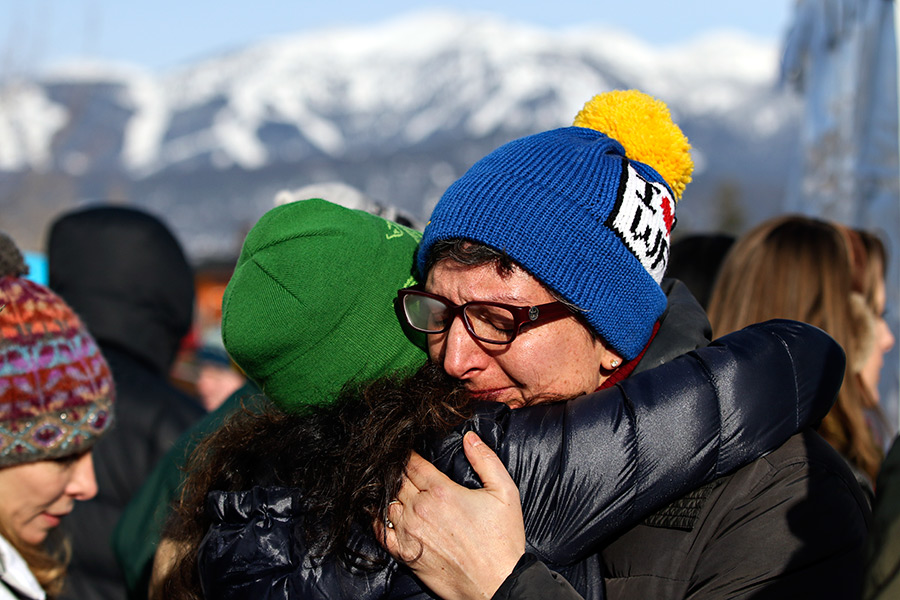Outdoor Block Party Celebrating Love, Not Hate, Draws Hundreds
Whitefish rally in sub-zero temperatures showcases community of diversity and love
By Tristan Scott
Hundreds of Whitefish residents gathered in the bitter cold Saturday morning for an outdoor block party to celebrate diversity and inclusivity in a mountain town that has been roiled by discrimination from afar.
The patchwork assemblage of faith leaders, business owners, artists, musicians, families, and friends stood out in stark contrast to a community tableau that has emerged recently in national media profiles, and evinced a small-town solidarity that defies the skewed perception that a white nationalist movement has taken root here.
While a flurry of attention has been paid to part-time resident and alt-right leader Richard Spencer and his connection to the town — garnering notice from a neo-Nazi website that has targeted local members of the Jewish faith — Saturday’s events focused squarely on Whitefish’s spirit of acceptance, showcasing musical performances and speeches delivered by a diverse cast of community leaders and artists.
The event included songs by Blackfeet singer and storyteller Jack Gladstone and his daughter, Mariah Gladstone, as well as remarks by Whitefish City Councilor Richard Hildner, Mennonite Pastor Jeryl Hollinger, and Hilary Shaw, executive director of the Abbie Shelter.
Shaw, whose grandfather is a Holocaust survivor, was among the speakers who addressed their Jewish faith, which has been singled out in recent online postings attacking the community.
Referencing the attacks against Whitefish’s Jewish population, Shaw encouraged residents to band together in peace rather than in anger, and to embrace the aspects of mountain culture that make the town unique.
“Go outside,” she said. “People that play together, stay together. I don’t believe that people are born bad. But I do believe that hurt people hurt people.”
Shaw was speaking of the campaign of harassment launched against members of the local Jewish community who live and own businesses here, and which culminated in a neo-Nazi website’s vow to organize an armed march through the streets of Whitefish and harass individuals online. The website — The Daily Stormer — called its actions an “old fashioned troll storm.”
Still, instead of focusing attention on the melee that has stemmed from the online postings, which also centered on Spencer and his so-called alt-right movement, locals coordinated a celebration called “Love Not Hate,” accentuating the many strands of acceptance in Whitefish and inviting a suite of speakers, singers, artists, and city leaders to address the crowd.
Students from local hula dance school Halau Ka Waikahe Lani Malie performed, while Missoula resident Andrea Castillo spoke about her experiences growing up as a Native American who is also gay, and the discriminatory repercussions that she has faced. Despite them, she has found acceptance in Montana.
“I have finally found a home where not everybody hates me,” she said of her roots here.
Rabbi Francine Roston, a Jewish leader who has been the target of some of the online postings, delivered a speech encouraging community fellowship.
“In the darkest nights of winter, this town, you beautiful people, this state and all of our elected representatives, you all lifted us up and we are so grateful,” she said. “You let us know that we are not alone. You let us know that our community, that our amazing, magnificent little town of Whitefish is not only protected by great defined mountains of earth but that this town is protected by a humanity that refuses to be quiet or sit still in the face of bigotry, racism, sexism, homophobia, or anti semitism.”
The event was organized by Jessica Laferriere, 34, and Dominica Cleveras, 33, who grew determined to prove that white nationalists and neo-Nazi groups did not define the community they loved, even as media coverage of the recent controversy obscured the celebratory tenor they were aiming to strike. Still, they hatched a plan for a community-wide celebration of diversity and acceptance of all people regardless of their ethnicity, religious beliefs, gender and gender identification, physical abilities and socio-economic status.
According to Laferriere, it was a success.
“I think this shows exactly how Whitefish feels,” she said after the event, which drew more than 300 attendees.